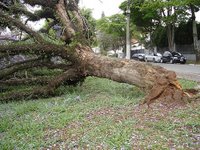This is the first in a new series Language Snippets. It will focus on "small" areas of the language which are not always explicitly covered by textbooks, but which often puzzle learners. Teachers whose mother tongue is not English may find the section interesting for their own language improvement, while both they and native speaker teachers will find it a useful source of explanations and exercises for use with their students. Let us know if you have any suggestions for areas to be included.
The word used after the verb fall depends on the previous position of the person or object that falls or the direction of the fall. Look at the following examples :
The bottle fell off the table. / My purse fell out of my bag.
In both cases the preposition after fall is the opposite of the preposition describing the previous position :
The bottle was on the table. It fell off.
My purse was in my bag. It fell out.

Down is used when the direction of the fall is specified, or to mean “fell to the ground” :
I fell down the stairs.
The bottle was on the table. It fell off.
My purse was in my bag. It fell out.

Down is used when the direction of the fall is specified, or to mean “fell to the ground” :
I fell down the stairs.
My keys fell down the drain.
A tree fell down during the storm.
To mean “fall to the ground” or “fall from a vertical to a horizontal position” you can also use fall over :
John fell over and hurt his knee./ A tree fell over in the storm.
Check your understanding with this exercise. What’s the missing preposition?
1. I fell …….. my bike and grazed both my elbows.
2. As I opened the book , an old letter fell …………….. it
3. I fell …………. the lake while I was fishing and got soaking wet.
4. I’ve never seen anyone so embarrassed as David when his trousers fell ….. !
5. The fire started because a candle fell …………. on the desk and some papers caught fire.
6. A bird had fallen …….. the chimney and the room was full of soot.
7. The room was so dark I couldn’t see anything, and I fell ………. the cat.
Answers :
1. off 2. out of 3. into 4. down 5. over 6. down 7. over
Acknowledgement
Photo by Cris. Provided under Creative Commons Licence via flickr.
Carter and McCarthy, Vocabulary and Language Teaching, Routledge
(It's always worth checking links to books on Amazon, even if they seem hideously expensive. They often have other new and used copies at much cheaper prices.)
No comments:
Post a Comment